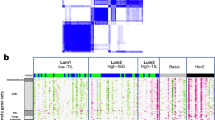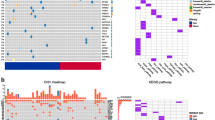Abstract
Aim
The aim of this study was to investigate gene expression in the peripheral blood mononuclear cells (PBMCs) of patients with HER2-positive breast cancer receiving trastuzumab. We also evaluated the effect of Fc-gamma receptor genotype on trastuzumab-driven gene expression.
Materials and methods
Gene expression was assessed by microarray analyses before and after administration of single-agent trastuzumab in 34 patients with metastatic HER2-positive breast cancer who were genotyped for Fc-gamma receptor (FcGR) IIA H131R and FcGRIIIA V158F. Gene set enrichment analysis (GSEA) was used to identify the gene sets that were significantly enriched after administration of trastuzumab in patient cohorts categorized by FcGR variant.
Results
At baseline three non-immune-related gene sets were identified only in patient cohort of FcGRIIA non-H/H variant. Thirty gene sets were identified in the cohort of FcGRIIIA V/V variants, while no gene set was identified in FcGRIIIA non-V/V variants one week after starting trastuzumab. Eleven gene sets were identified in FcGRIIA H/H variants 8 week after starting trastuzumab, but none in non-H/H variants. Immune-related gene sets were significantly down-regulated after administration of trastuzumab.
Conclusion
The response of PBMCs to trastuzumab markedly varied with polymorphisms in FcGRIIA and FcGRIIIA. These results indicate that FcGR polymorphisms contribute to the systemic immune reaction triggered by trastuzumab. Further investigations are needed to clarify the biological effects of FcGR variation on the mechanism of trastuzumab activity.

Similar content being viewed by others
References
Slamon DJ, Clark GM, Wong SG, Levin WJ, Ullrich A, McGuire WL. Human breast cancer: correlation of relapse and survival with amplification of the HER-2/new oncogene. Science. 1987;235:177–82.
Andre F, Dieci MV, Dubsky P, Sotiriou C, Curigliano G, Denkert C. Molecular pathways: involvement of immune pathways in the therapeutic response and outcome in Breast Cancer. Clin Cancer Res. 2012;19:28–33.
Woof JM, Burton DR. Human antibody-Fc receptor interaction illuminated by crystal structures. Nat Rev Immunol. 2004;4:89–99.
Bournazos S, Woof JF, Hart SP, Dransfield I. Functional and clinical consequences of Fc receptor polymorphic and copy number variants. Clin Exp Immunol. 2009;157:244–54.
Armour KL, Van de Winkel JGJ, Willamson LM, Clark MR. Differential binding to human Fc gamma IIA and Fc gamma IIB receptors by human IgG wild type and mutant antibodies. Mol Immunol. 2003;40:58–593.
Koene HR, Kleijer M, Algra J, Roos D, von dem Borne AE, de Haas M. Fc gammaRIIIa-158 V/F polymorphism influences the binding of IgG by natural killer cell Fc gammaRIIIa, independently of the Fc gammaRIIIa-48L/R/H phenotype. Blood. 1997;90:1109.
Carson WE, Parihar R, Lindeman MJ, Personeni N, Dierksheide J, Meropol NJ, et al. Interleukin-2 enhances the natural killer cell response to Herceptin-coated HER2/new-positive breast cancer cells. Eur J Immnol. 2001;31:3016–25.
Tamura K, Shimizu C, Hojo T, Akashi-Tanaka S, Kinoshita T, Yonemori K, et al. FcγR2A and 3A polymorphisms predict clinical outcome of trastuzumab in both neoadjuvant and metastatic settings in patients with HER2-positive breast cancer. Ann Oncol. 2011;22:1302–7.
Musolino A, Naldi N, Bortesi B, Pezzuolo D, Capelletti M, Missale G, et al. Immunoglobulin G fragment C receptor polymorphisms and clinical efficacy of trastuzumab-based therapy in patients with HER-2/neu-positive metastatic breast cancer. J Clin Oncol. 2008;26:1789–96.
Hurvitz SA, Betting DJ, Stern HM, Quinaux E, Stinson J, Seshagiri S, et al. Analysis of Fcγ receptor IIIa and IIa polymorphisms: lack of correlation with outcome in trastuzumab-treated breast cancer patients. Clin Cancer Res. 2012;18:3467–86.
Mellor JD, Brown MP, Irving HR, Zalcberg JR, Dobrovic A. A critical review of the role of Fc gamma receptor polymorphisms in the response to monoclonal antibodies in cancer. J Hemat Oncol. 2013;6(1):8722–6.
Therasse P, Arbuck SG, Eisenhauer EA, Wanders J, Kaplan RS, Rubinstein L, et al. New guidelines to evaluate the response to treatment in solid tumors. European Organization for Research and Treatment of Cancer, National Cancer Institute of the United States, National Cancer Institute of Canada. J Natl Cancer Inst. 2000;92:205–16.
Chomczynski P, Sacchi N. Single-step method of RNA isolation by acid guanidinium thiocyanate-phenol-chloroform extraction. Anal Biochem. 1987;162:156–9.
www.broadinstitute.org.gsea. Accessed 13 July 2011.
Tsavaris N, Kosmas C, Vadiaka M, Kanelopoulos P, Boulamtsis D. Immune changes in patients with advanced breast cancer undergoing chemotherapy with taxanes. Br J Cancer. 2002;87:21–7.
Tichatchek E, Zielinski CC, Muller C, Sevelda P, Kubista E, Czerwenka K, et al. Long-term influence of adjuvant therapy on natural killer cell activity in breast cancer. Cancer Immunol Immunother. 1988;27:278–82.
Wang Y, Wang S, Ding Y, Ye Y, Xu Y, He H, et al. A suppressor of cytokine signaling 1 antagonist enhances antigen-presenting capacity and tumor cell antigen-specific cytotoxic T lymphocyte responses by human monocyte-derived dendritic cells. Clin Vaccine Immunol. 2013;20:1449–56.
Srivastava RM, Lee SC, Andrade Filho PA, Lord CA, Jie HB, Davidson HC, et al. Cetuximab-activated natural killer and dendritic cells collaborate to tumor antigen-specific T-cell immunity in head and neck cancer patients. Clin Cancer Res. 2013;19:1858–72.
Benson DM, Calguiri MA. Killer immunoglobulin-like receptors and tumor immunity.Cancer. Immunol Res. 2014;2:99–104.
Bakema JE, van Egmond M. Fc receptor-dependent mechanisms of monoclonal antibody therapy of cancer. Curr Top Microbiol Immunol. 2014;382:373–92.
Albanesi M, Mancardi DA, Jonsson F, Iannascoli B, Fiette L, Si Santo JP, et al. Neutophils mediate antibody-induced antitumor effects in mice. Blood. 2013;122:3160–4.
Arnould L, Gelly M, Penault-Llorca F, Benoit L, Bonnetain F, Migeon C, et al. Trastuzumab-based treatment of HER2-positive breast cancer: an antibody-dependent cellular cytotoxicity mechanism? Br J Cancer. 2006;94:259–67.
Loi S, Michiels S, Lambrechts D, Fumagalli D, Claes B, Kellokumpu-Lehtinen PL, et al. Tumor PIK3CA mutations, lymphocyte infiltration, and recurrence-free survival (RFS) in early breast cancer (BC): results from the FinHER trial. J Clin Oncol 2012; 30 (suppl.; abstr 507).
Ono M, Tsuda H, Shimizu C, Yamamoto S, Shibata T, Yamamoto H, et al. Tumor-infiltrating lymphocytes are correlated with response to neoadjuvant chemotherapy in triple-negative breast cancer. Breast Cancer Res Treat. 2012;132:793–805.
Perez EA, Thompson EA, Ballman KV, Anderson SK, Asmann YW, Kalari KR, et al. Genomic analysis reveals that immune function genes are strongly linked to clinical outcome in the North Central Cancer Treatment GroupN9831 adjuvant trastuzumab trial. J Clin Oncol. 2015 (e-pub ahead of print).
Acknowledgments
This study was financially supported by Health and Labor Grants for Research in Advanced Medical Oncology (H17-pharmaco-006). We would like to thank Editage (www.editage.jp) for English language editing.
Conflict of interest
The authors have no conflicts of interest to declare.
Author information
Authors and Affiliations
Corresponding authors
Electronic supplementary material
Below is the link to the electronic supplementary material.
About this article
Cite this article
Shimizu, C., Mogushi, K., Morioka, M.S. et al. Fc-Gamma receptor polymorphism and gene expression of peripheral blood mononuclear cells in patients with HER2-positive metastatic breast cancer receiving single-agent trastuzumab. Breast Cancer 23, 624–632 (2016). https://doi.org/10.1007/s12282-015-0614-y
Received:
Accepted:
Published:
Issue Date:
DOI: https://doi.org/10.1007/s12282-015-0614-y




